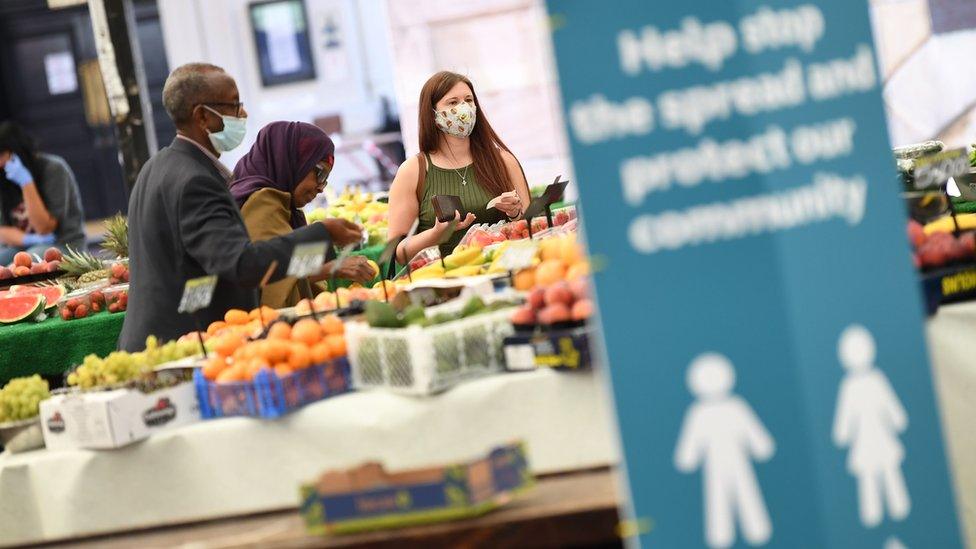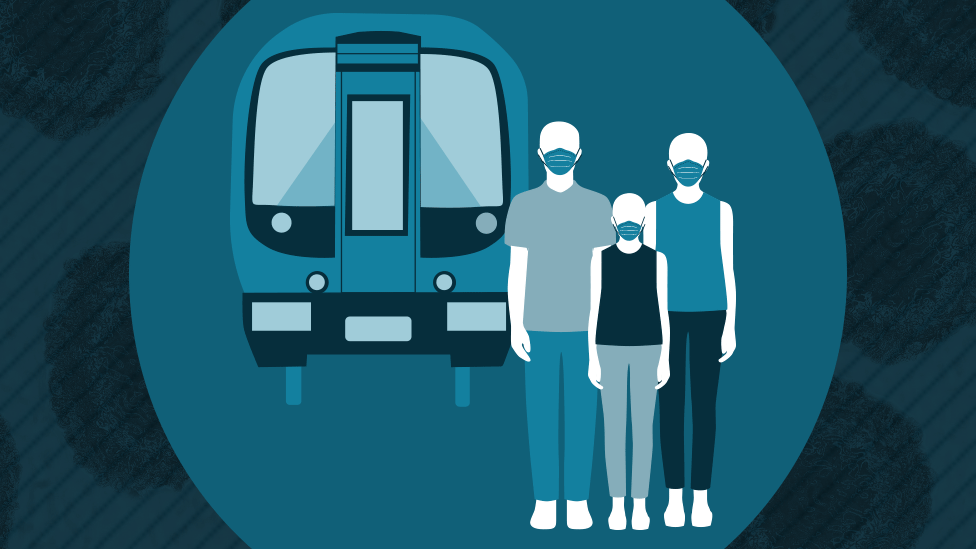Coronavirus: Councils in England get new powers for local shutdowns
- Published

People wearing face masks as they shop at an open fruit and vegetable market in Leicester
Councils in England have been given new powers to close shops, cancel events and shut outdoor public spaces to manage local outbreaks of coronavirus.
The PM said the move would enable councils to respond more quickly to outbreaks "where speed is paramount".
The Local Government Association said it hoped it would prevent the need for stricter local lockdown measures.
Meanwhile, a government scientific adviser has warned a return to pre-lockdown life remains "a long way off".
A further 40 coronavirus deaths have been announced, external, taking the total number of people who have died after testing positive for coronavirus in the UK to 45,273.
'Lightning lockdowns'
Announcing the new powers for councils, Prime Minister Boris Johnson told Friday's Downing Street press briefing: "It has to be right that we take local action in response to local outbreaks - there is no point shutting down a city in one part of the country to contain an outbreak in another part of the country".
Mr Johnson also said ministers would receive clearer guidance on where they can intervene to "close whole sectors or types of premises in an area" and advise people in specific postcodes to stay at home.
Government guidance says the move "significantly" increases councils' powers, external, and as such, should be used "with discretion".
Mr Johnson said the additional powers would allow local authorities "to act more quickly in response to outbreaks where speed is paramount", in what he called "lightning lockdowns".
PM announces powers to tackle local outbreaks
James Jamieson, chairman of the LGA, which represents council leaders in England, welcomed the announcement, saying the extra powers will hopefully lessen the need for stricter measures being introduced locally.
"Councils know their local communities best and know how to address each unique outbreak," Mr Jamieson said.
He added that the use of enforcement powers "should be an option of last resort" and called for more "granular-level data" to be made available to councils to allow them to be "better able to act in real time to increases in infection rates".
Liverpool City Region mayor Steve Rotheram said more detailed data, such as the daily number of people reporting symptoms, would enable councils to target messaging to certain groups, for example younger people in a particular area.
"The messaging, therefore, might be that we use some of our footballers to get the message over not to go out or to wear face masks or coverings," he said.
"It really is about making certain that we can get the correct message to the right people at the right time."


Transport Secretary Grant Shapps told the BBC the government would provide daily updates to local areas.
He said there had been "issues" with data sharing because of the General Data Protection Regulation rules.
"We've been working through all of that to put these local agreements in place and that will help dramatically," the transport secretary told Radio 4's Today programme.
The new powers for councils came as the prime minister set out a "roadmap" for a return to "normality" by Christmas as part of an easing of the lockdown in England.
Mr Johnson said it was his "sincere hope" the remaining restrictions could be reviewed in November, at the earliest, and possibly dropped by Christmas.

At-a-glance: The latest changes in England
From 25 July indoor gyms, pools and other sports facilities can reopen
On 1 August the government will update its advice on going to work, asking employers to make decisions about how and where their staff can work safely
From the same date, most remaining leisure settings, including bowling, skating rinks, casinos and all close contact services, such as beauticians, will be allowed to reopen
Live indoor theatre and concerts will be able to resume with socially distanced audiences
Wedding receptions for up to 30 people will also be allowed from next month
From September, schools, nurseries and colleges will be open for all children and young people on a full-time basis, while universities are also working to reopen as fully as possible
From October, the government intends to allow audiences to return to stadiums, while conferences and other business events can recommence, subject to the outcome of pilots

But Prof John Edmunds, a member of the government's Scientific Advisory Group for Emergencies (Sage), told the BBC a return to pre-lockdown normality was "a long way off".
"If what you mean by normality is what we used to do until February and the middle of March this year - go to work normally, travel on the buses and trains, go on holiday without restrictions, meet friends, shake hands, hug each other and so on - that's a long way off, unfortunately," he told the Today programme.
"We won't be able to do that until we are immune to the virus, which means until we have a vaccine that is proven safe and effective.
"If we return to those sort of normal behaviours, the virus will come back very fast."
Back to work?
Also on Friday, the government dropped its advice to avoid public transport in England.
Employers were also told it would be up to them to discuss with workers whether it was safe for them to return to workspaces from 1 August.
Mr Shapps told BBC Breakfast the use of public transport was "way down" and there was spare capacity for people to return, even with social distancing.
"We're seeing in many cases quite empty, for example trains, particularly during the day, and we're saying actually there is more capacity there. You can now return - anybody, not just key workers, can now use public transport."
However, he advised people to continue to walk or cycle to work if they could.
Devolved administrations in Scotland, Wales and Northern Ireland have the power to set their own timings for the easing of restrictions.

SOCIAL DISTANCING: What are the rules now?
YOUR QUESTIONS: Our experts have answers
LOOK-UP TOOL: How many cases in your area?
THE R NUMBER: What it means and why it matters

Meanwhile, Health Secretary Matt Hancock has called for an urgent review into how coronavirus deaths have been recorded in England after Public Health England said that deaths may have included people who tested positive months before they died.
Other UK nations only include those who died within 28 days of a positive test.
PHE said it will continue to make the figures available on its dashboard., external
But officials at the Department for Health and Social Care said it will no longer link to the data on social media posts or update the figures on the department's own coronavirus webpage while it conducts the review.

LOVE IN LOCKDOWN: How to keep romance ticking over during a global pandemic
YOU, ME AND THE BIG C: The challenges of giving cancer care in the current climate


- Published21 May 2021

- Published31 January 2022
